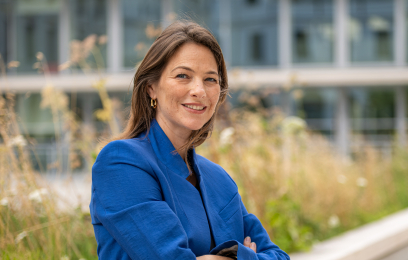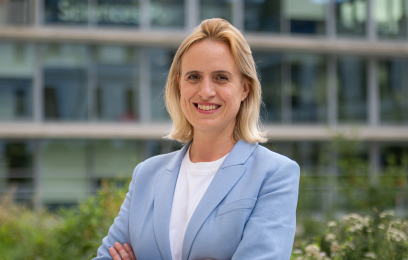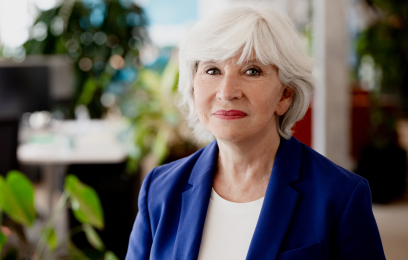Paris, 18 February 2022 - Mathias Vicherat, President of Sciences Po, has appointed Arancha González Laya as Dean of the Paris School of International Affairs (PSIA) and Philippe Martin as Dean of the School of Public Affairs. These appointments were made on the basis of proposals by two Search Committees, composed of members from within and outside Sciences Po. The pair will take up their respective positions at the beginning of March.
"These two appointments open a new chapter in Sciences Po’s history. I am delighted to welcome Arancha Gonzalez Laya, whose rich political experience at national, European and international level will take us to a new phase in PSIA’s development. Philippe Martin knows Sciences Po inside out: a distinguished economist within our permanent faculty, he has also chaired the Conseil d'Analyse Économique (CAE) since 2018. He comes to the role with a strategic vision for the School of Public Affairs that combines academic excellence with a bid to tackle new challenges in the training of future leaders."
Arancha Gonzalez Laya, the new Dean of PSIA
Ms Arancha Gonzalez Laya holds a degree in law from the University of Navarra and a Postgraduate Degree in European Law from University Carlos III of Madrid. She has been a member of PSIA’s Strategic Committee since 2017 and has extensive experience of international affairs at multilateral, European and national levels. Most recently, Gonzalez served as Spain’s Minister of Foreign Affairs, European Union and Cooperation (2020-2021); Under-Secretary-General of the United Nations and Executive Director of the International Trade Centre (2013-2020); Cabinet Director for the Director-General of the World Trade Organization, Pascal Lamy (2005-2013), and has held several senior positions within the European Commission.
In assuming her duties as Dean, Ms Gonzalez Laya will build on the achievements of Ghassan Salamé, the founding dean of PSIA (established in 2010), and Dean Enrico Letta, whom she succeeds. PSIA’s success is reflected in Sciences Po's current ranking as second in the world for "Politics and International Studies”, according to the QS World University Rankings 2021. The school owes much of its excellence to its faculty, which is composed in equal proportion of academics and professionals renowned within their field of work. As the world's largest school of international affairs, 70% of PSIA’s 1,500 students are international students, coming from over 110 countries. The school offers a choice of seven Master's degree programmes in key fields of international affairs and has established partnerships and dual degrees with leading universities around the world.
Arancha Gonzalez Laya: "After a long career in international affairs, I have decided to devote my passion and energy to preparing the leaders of tomorrow. I am very honored to be joining Sciences Po as the director of PSIA, which ranks second in the world among schools of politics and international studies. By investing in knowledge, skills and experience, PSIA plays a unique role in training international actors to understand and shape our complex world. I would like to thank Mathias Vicherat for putting his trust in me and I look forward to working towards a more sustainable and peaceful world with him, his faculty and the students of Sciences Po.”
Philippe Martin, new Dean of the School of Public Affairs
Philippe Martin holds degrees from Sciences Po, Paris Dauphine University and a PhD in Economics from Georgetown University, Washington DC.
Mr Martin is a Professor of Economics at Sciences Po, the Chairman of the Conseil d'Analyse Économique (CAE), the Vice-President and a Research Fellow in international macroeconomics and trade at the Centre for Economic Policy Research (CEPR) and the Vice-President of the Board of Directors of the FNSP. He succeeds Yann Algan as Dean of the School of Public Affairs.
Mr Martin has previously worked as an economist at the Federal Reserve Bank of New York (2001-2002), a professor at the Paris School of Economics (2000-2008) and at the Graduate Institute in Geneva, the director of Sciences Po’s Department of Economics (2008-2013) and as an economic advisor to Emmanuel Macron during his time as Minister of the Economy, Industry and Digital Affairs from 2015-2016. He was also co-editor of the journal Economic Policy from 2006 to 2011 and has served as a consultant to the Bank of France. In 2002, Mr Martin was awarded the Prize for the Best Young Economist in France.
Seven years since its founding, the Sciences Po School of Public Affairs has established itself as one of the finest programmes in public affairs on a national and international scale. The school hosts 2,100 students, 30% of whom are international, across its two Master’s programmes and eleven policy streams taught in both French and English, its national and international dual degrees, its preparatory programmes for competitive recruitment exams for the French and European civil service (76% of candidates admitted to the ENA in 2021 came from Sciences Po) and its one-year masters programmes. Today, the School of Public Affairs is working to reinvent its vision of training future decision-makers in the public sector to emphasize European integration and the challenges of digital and environmental changes.
Philippe Martin: "Sciences Po is very dear to me as an institution where I have worked in a number of different capacities, and I am delighted now to be taking over the direction of the School of Public Affairs. Working in collaboration with each of the school’s communities, I want it to continue to exemplify academic excellence and to rise to the challenges of shifts in public affairs both in France and in Europe.”
About Sciences Po
Founded in 1872, Sciences Po is France’s leading research university in the social sciences. Sciences Po is an international research university, both selective and open onto the world, ranking among the finest institutions in the fields of humanities and social sciences.
For more information on Sciences Po: www.sciencespo.fr/en
Media contacts
Claire Flin - +33 6 95 41 95 90 - clairefline@gmail.com

28.07.2025
JULIE KLEIN APPOINTED DEAN OF THE LAW SCHOOL AT SCIENCES PO
Paris, 28 July 2025 – Luis Vassy, President of Sciences Po, has appointed Julie Klein as Dean of the Law School. She succeeds Sébastien Pimont.
Julie Klein has been a professor at Sciences Po since 2020, and she currently leads the “Enterprises, Markets, Regulations” (EMR) specialism within the Master's in Economic Law. A widely respected legal scholar, she is an expert in the law of obligations, the law of evidence, and economic law. She is a member of the Scientific Council of Sciences Po, chairs the student disciplinary committee, and serves as scientific director of La Semaine juridique – édition entreprise (JCP E).
Her research explores the interplay between civil and commercial law. She contributes actively to collective reflections on the evolution of law, participating in several working groups led by the Ministry of Justice and the High Legal Committee for the Financial Markets of Paris (HCJP), mainly on the reform of the law of obligations, corporate law, and international chambers.
Luis Vassy, President of Sciences Po: “Julie Klein is an outstanding jurist and scholar who has been deeply involved in the Law School and more broadly within the institution for several years. At a time when global upheavals are reshaping the boundaries of law, she will lead the School's project with vision and ambition. I have full confidence in her commitment, her intellectual rigour and her ability to uphold and further elevate the Law School's standing at the highest level.
I would like to express my gratitude to Sébastien Pimont for his leadership over the past five years. His tenure has been marked by significant achievements – in France, with the remarkable success of our students across all legal professions, and internationally, as demonstrated by the School's growing global appeal.”
Julie Klein, Dean of the Law School at Sciences Po: “I am deeply honoured by this appointment and grateful to Luis Vassy for his trust. Thanks to the work of my predecessors, Sciences Po's Law School has established a strong and innovative identity. I intend to build on this momentum, by consolidating its academic excellence, strengthening ties with the legal profession, and supporting students in their ability to understand and practise law in a world undergoing profound transformation.”
Read more

